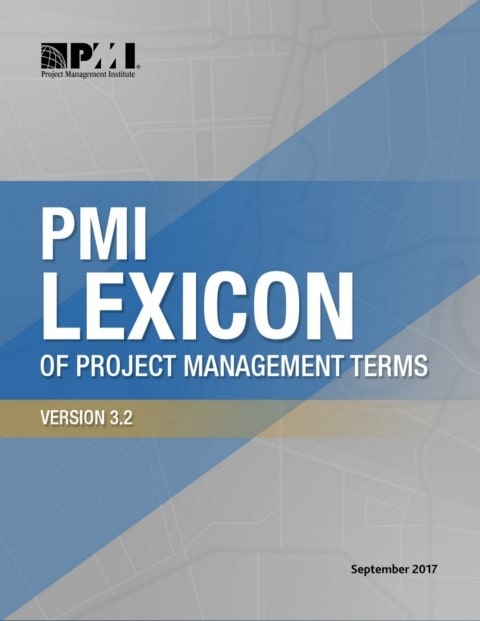Project Management Terminology, Common Jargon, and Lexicon
Published:
Updated:

In linguistics, i.e., the study of language, a lexicon is the complete list of words within a language. Unlike vocabulary, which measures individual proficiency, a lexicon is what you find in dictionaries, i.e., every word in the English (or any other) language. This distinction is essential to the topic I'm going to discuss in this article. When you enroll in a PMP Certification training you learn the project management terminology. PMI lexicon of project management terms

(Source: PMI)
This is often called jargon.
While jargon's actual definition is just technical terminology, it has acquired a bad reputation. People believe that the lexicon or glossary required by the Project Management Professional Certification is elitist or unnecessary. Of course, the glossary is only one aspect of what you learn during your PMP training. You also learn about different project management methodologies. However, every method has its specific project management terminology.
Project Management Terminology as Part of PMP Certification Training Programs
While language serves multiple purposes, its primary purpose is communication. Having the vocabulary for effectively putting across ideas is essential. Language needs to fulfill this basic need. This is the same logic behind project management terminology and its jargon in particular.
According to Akmajian et al. (2001), "In virtually every recognized profession, a special vocabulary evolves to meet the particular needs of the profession. This special, or technical, vocabulary is known as jargon." This concise definition serves our purposes well. It has none of the negative connotations people now associate with the word.
By this definition, jargon is essential to every profession. The best-known examples would be in more scientific fields like medicine, engineering, computer science, etc. In these fields, unless you specialize in them, you are unlikely to understand everything immediately. Of course, jargon does not necessarily mean "hard to understand." But this is the meaning it has gained over time.
Therefore, differentiating lexicon and jargon is a good idea. Lexicon, although a lesser-known word, has no negative connotations. However, this then raises questions about the need for a project management lexicon.
The Need for a Project Management Lexicon
People with the Project Management Professional Certification understand the need for a lexicon. But prospective PMP exam takers question the need for a glossary. To the ordinary layperson, a project management lexicon seems unnecessary.
Here, it is essential to note that a lexicon gives you quick ways to communicate about project developments. Let's look at an example, Backward Pass. On its own, this phrase is probably confusing, even random. Both words mean something individually. It might mean going backward, and, in a sense, that's true. However, the precise definition is:
"Backward Pass. A critical path method technique for calculating the late start and late finish dates is by working backward through the schedule model from the project end date. See also forward pass."
This definition immediately raises questions - what is a critical path method? What does a schedule model mean? You can find the meaning of the critical path method on page 3 and the schedule model on page 11.
Tying Different Definitions
The PMI definition for backward pass also points you to forward pass - a related term. This way, it connects multiple methods. The question, then, is whether you need to use a backward or forward pass to solve a problem. You get your answer from ATP's Project Management courses online!
However, this then serves the double purpose of you learning two related terms. When people imagine studying project management terminology, they think they need to mug it up. But the best online Project Management Certificate Programs teach you how these terms are connected. They give you situations where you would use either, so you completely understand how they are interconnected.
Therefore, PMI's 200-word project management lexicon is much like the English language. When you learn a language, you remember words in context. You cannot memorize them in empty definitions. Similarly, when you learn the meaning of backward pass, you simultaneously learn what critical path method, schedule model, and forward pass mean. You also tie these into your project management methods, contextualizing them.
Practical Applicability of a Project Management Professional Certification Lexicon
(Source: PMI)
Apart from the quick communication that project management jargon enables, it also sets a standard. With a Project Management Professional Certification, companies worldwide covet you. This often means that project teams know the lexicon to an extent.
Therefore, even if you switch project teams, companies, or even shift countries, the lexicon ensures that nothing gets "lost in translation." There is no space for such confusion. Wherever you go, when you use a term like backward pass, your project team knows what you mean.
Additionally, as the graph above shows, knowledge transfer becomes much more comfortable and smooth after adopting PMI certifications. When explaining a project to a new manager, you can use terms without worrying that they won't understand. This is where "jargon" is technical but necessary - especially for time-sensitive projects, having quick ways to communicate essential information matters.
Case Study: Telstra
If you are still unconvinced about the need for a lexicon, let's take a case study. Telstra is a leading Australian telecommunications and technology company that focuses on the Asia-Pacific region. I'm taking a non-American example on purpose, so you see the benefits of having such a lexicon.
Telstra launched a program, certifying 400+ of GSP's project managers in mid-2015. The main goal behind this was to "establish core qualifications and a shared understanding of how projects are run." This establishment created a standard for every individual to adhere to. By having their employees attend Project Management Courses online, Telstra ensured that their business and strategy model was scalable. This scalability was primarily because everyone was on the same page.
They spoke the same language.
Learning the jargon and the fundamental project management terminology enabled the teams to deliver value across their projects consistently. It fostered better communication and company culture. This, in turn, motivated teams to work harder and be more productive. Therefore, the company experienced substantial growth after adopting this model.
Therefore, the importance of the lexicon you learn at the best online Project Management Certificate programs is undeniable. It makes managing every aspect of the project much smoother. The lexicon enables easy communication, with a clear understanding of every situation. Therefore, you learn this during your PMP training. It just makes you a better, more reliable manager.

